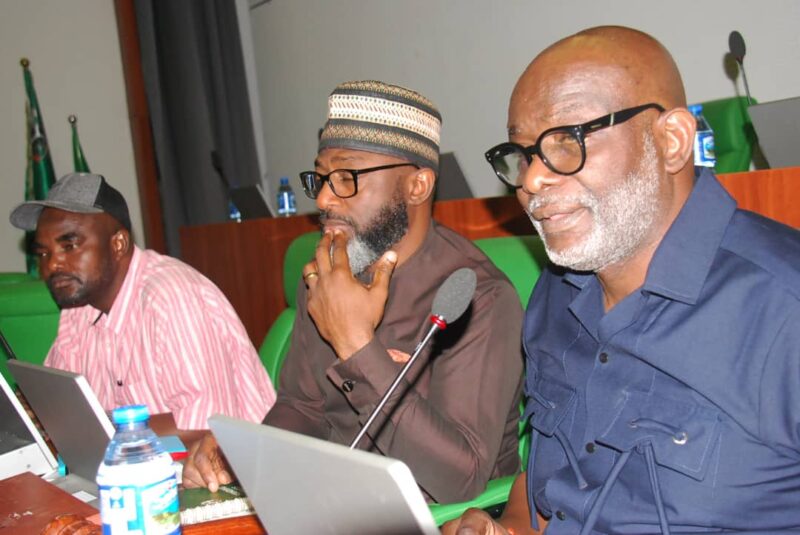2
Torkwase Nyiekaa
The Chairman of the House of Representatives Ad-hoc Committee probing the economic, regulatory and security implications of cryptocurrency adoption and Point-of-Sale (POS) operations, Hon. Olufemi Bamisile, has raised serious concern over the rising wave of fraud within Nigeria’s POS sector and the spread of unlicensed crypto activities among operators.
Speaking during the Committee’s resumed investigative hearing on Monday with fintech leaders, POS associations and regulatory and security agencies, Bamisile said recent submissions had exposed worrying vulnerabilities across the country’s rapidly expanding digital-finance ecosystem.
He disclosed that the Committee has received reports of unregistered agents, cloned POS terminals, anonymous transactions and weak Know-Your-Customer (KYC) procedures, issues he warned are exposing Nigerians to avoidable financial losses, cybercrime and security breaches.
“We are deeply worried about the escalating fraud linked to POS operations,” he said. “Unprofiled agents, cloned terminals and poor KYC practices continue to endanger citizens in ways that are entirely preventable.”
Bamisile also expressed concern over the growing number of POS operators offering cryptocurrency and digital-asset services without regulatory approval. He warned that such activities could fuel money laundering, terrorism financing and data manipulation while misusing payment tools designed for basic financial transactions.
“There is credible information that some POS agents now offer crypto services without authorisation. This raises serious concerns around anti–money laundering compliance, data integrity and the abuse of payment platforms,” he said.
He further revealed that the Committee has been alerted to a rise in fraudulent company registrations at the Corporate Affairs Commission (CAC), some of which allegedly use stolen National Identification Numbers (NIN) and Bank Verification Numbers (BVN) to open accounts and launder illicit funds through unverified POS channels.
According to him, these developments highlight major gaps in the nation’s verification systems and underscore the need for a coordinated oversight structure.
Bamisile also raised alarm over major fintech firms storing sensitive customer information on foreign servers, warning that offshore data storage limits the ability of regulators and security agencies to conduct timely audits, trace suspicious transactions or enforce compliance.
“This has direct national-security implications, especially in a sector that is already vulnerable to terrorism financing and cyber-enabled crimes,” he said.
He, however, assured operators that the investigation is not a witch-hunt, acknowledging that the industry itself faces challenges such as overlapping regulatory mandates, inconsistent policies and multiple compliance demands. He said the Committee’s goal is to craft recommendations that will harmonise regulations, strengthen security safeguards, improve consumer protection and support responsible innovation.
The Committee will continue engagements with stakeholders before submitting its final report to the House.
The National President of the Association of Digital Payment and POS Operators of Nigeria (ADPPON), Mr. Paul Okafor, also warned lawmakers that the POS ecosystem has reached a crisis point, with fraud escalating to levels that now threaten national security.
He said the rapid expansion of the POS industry has overwhelmed regulators, leaving gaps that criminals are aggressively exploiting. While POS operators have grown from 50,000 in 2017 to more than 2.3 million today, regulatory capacity, he noted, increased by “less than 10 percent.”
“This imbalance is what has produced the crisis we are facing,” he said. “The regulators, especially the CBN, are not incompetent; they are overwhelmed by the speed and scale of growth.”
Okafor cited data from the Nigeria Inter-Bank Settlement System (NIBSS), which showed that POS and digital-payment channels recorded fraud losses of N17.67 billion in 2023 affecting over 80,000 customers. The situation worsened dramatically in 2024, with losses rising to N52.26 billion, a leap of N34.59 billion in one year.
He noted that attempted fraud across financial platforms surged by 338 percent, with POS channels alone responsible for over 26 percent of all reported cases. Industry monitor FITC also recorded a 95 percent spike in POS fraud in the fourth quarter of 2024.
“More than 38,000 POS fraud cases were officially reported in one year,” he said. “But we estimate that over 70,000 cases go unreported because victims simply give up.”
He warned that criminals are now using POS agents as cash-out points for ransom payments and other illicit funds. In some states, he said, nearly 40 percent of kidnap ransom payments pass through informal POS channels, describing the situation as a direct national security threat.
Okafor urged lawmakers to push for urgent reforms by the Central Bank of Nigeria (CBN) to restore order and rebuild confidence in the system. He cautioned that failure to act would deepen fraud, weaken financial inclusion and erode public trust.
“When trust collapses, the entire financial system collapses,” he said.
To reverse the trend, ADPPON is calling for a compulsory Cybercrime Clearance Certificate issued by the Nigeria Police Force–NCCC for all POS operators, mandatory CAC registration of every POS business, and obligatory membership of recognised trade associations to enforce discipline, training and self-regulation.
Okafor cited global best practices from countries such as Brazil, India, Kenya, South Africa and the United Kingdom, which enforce strict verification processes, background checks and continuous certification to curb fraud.
“No country exposes its financial system to millions of operators without strict controls. Nigeria must not be the exception,” he warned.
He emphasised that POS services now reach almost every home, market and local government in the country, noting that the Committee’s actions will determine whether Nigeria becomes safer or criminals continue to exploit the system.
“You are the guardians of Nigeria’s financial stability,” Okafor told lawmakers. “If this Committee acts decisively, Nigeria will be safer. If it hesitates, criminals will continue to win.”








